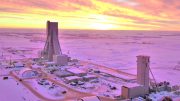There have been many articles of late stating there are simply no more giant deposits to be discovered, particularly in the developed world. However, as a working geologist, my impression is that there hasn’t been enough systematic and continuous exploration in over 15 years, and it’s this lack of exploration that has led to the decrease in major mineral discoveries.
Grassroots mineral exploration began its slow demise in 1991, when a number of countries started introducing gold taxes and the like. Exploration almost died out completely at the end of 1997 due to plummeting commodity prices and the Bre-X Minerals scandal. In the ensuing years, there was little exploration of any description until mid-2003, when it began to pick up.
Even then, most exploration projects that got off the ground in the 2004-08 period were simply the revival of prospects, deposits and brownfields projects identified before 1997. True grassroots exploration did not really begin to reappear until 2007, and by the end of 2008, much of it had disappeared again due to the global economic crisis.
Today, many companies with cash are trolling around looking for established deposits to buy into. However, if a junior company did not manage to find a significant hint of a drill-ready deposit before 2008, they are likely in deep trouble now, even if the ground is highly prospective.
There have also been a couple of other detrimental developments since the 1990s. One is the loss of the mid-sized company. Before the 1997 crash, there were quite a few mid-sized mining companies. Most had a mine, or several, and they channelled some mining profits back into finding and developing grassroots mineral projects. After 1997, the largest companies, which were getting increasingly desperate for reserves, bought out most of the mid-sized companies.
A few small-to-mid-sized companies are starting to rise again, but they are dwarfed by the enormous market cap of the handful of the industry’s super-giants. There are few true “mid-sized companies” left.
While this phenomenon isn’t necessarily deterring companies from trying to grow, the creation of a marketplace that is polarized between thousands of junior exploration companies begging for money from investors, and a handful of mining giants has severely handicapped true grassroots exploration.
Some of the giants are starting to sponsor junior companies with pure grassroots plays, but again, that is a development that only began late last year, and it can take five years or more to deliver positive results.
Another contributor to the dearth of exploration is the investor mindset that was born of the dot-com era. Investors became accustomed to, and now want, instant returns and are loath to invest money in a junior mineral exploration company, which may not return investment money for five years or longer.
To cap it all off, there is a lack of geologists and head office personnel with genuine grassroots exploration experience.
As a geologist who has worked around the world, I believe there are still large deposits out there to be found in the friendly developed world, as well as some true monsters in the developing world.
But with the current overall negative attitude towards investing in grassroots exploration, the average explorer will continue to struggle to find anything new.
And that means hundreds of eager exploration geologists will sit out another market downturn and won’t be looking for that next big deposit because not enough people will invest over the long term in grassroots exploration.
— Based in North Vancouver, the author is a professional geologist and principal of Geozu Consulting,www.geozu.com.




Be the first to comment on "Commentary: Are There No Giant Deposits Left To Be Found?"